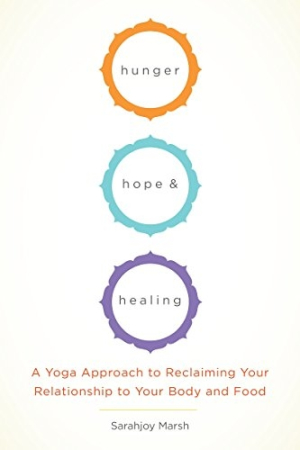Hunger, Hope, and Healing
A Yoga Approach to Reclaiming Your Relationship to Your Body and Food
With the voice of a caring yoga teacher, Marsh inspires people facing food-based issues to integrate mindfulness into their eating.
Yoga is often touted for its positive effects on stress, flexibility, and balance. But the centuries-old practice is also increasingly used for deeper therapeutic benefits, and Sarahjoy Marsh notes that yoga can help people overcome disordered eating patterns that range from stress eating to chronic food addiction.
A yoga teacher who founded a nonprofit yoga therapy center, Marsh provides a clear, well-articulated guide for those who are facing food-based issues and want to try yogic wisdom as part of their therapy. Hunger, Hope, and Healing includes many helpful yoga poses for people facing specific problems, but this isn’t a how-to manual in its step-by-step pose approach. Instead, Marsh integrates yoga-inspired therapeutic basics, such as resilience, joy, and discipline, to demonstrate how those principles can apply to appetites—both literal and figurative.
Acknowledging that food issues are very rarely about eating, she gently peels back the layers of potential challenges that a reader might be facing, such as shame, isolation, anxiety, and depression. As gently but decisively as a talented yoga teacher, Marsh discusses painful topics and offers suggestions that will help a reader face those problems with greater self-awareness.
Although she presents a breadth of insight and advice about a wide range of food issues, Marsh also weaves her personal experience into the text, kicking off the book with her own struggles as a young art student in Boston. “At the time, I did not have the language to describe what was happening to me,” she writes. “I felt certain that what was ‘happening to me’ was only happening to me. I felt incredibly alone, bleak and distressed, usually most painfully at night.”
These memories gives Marsh’s work a personal tone that inspires trust. She shares how yoga ushered in a more nurturing, wise, caring voice for herself, and throughout the book, she works to become that voice for others. This should prove an invaluable and supportive resource for many going through these issues and those who are trying to help them.
Reviewed by
Elizabeth Millard
Disclosure: This article is not an endorsement, but a review. The publisher of this book provided free copies of the book to have their book reviewed by a professional reviewer. No fee was paid by the publisher for this review. Foreword Reviews only recommends books that we love. Foreword Magazine, Inc. is disclosing this in accordance with the Federal Trade Commission’s 16 CFR, Part 255.

